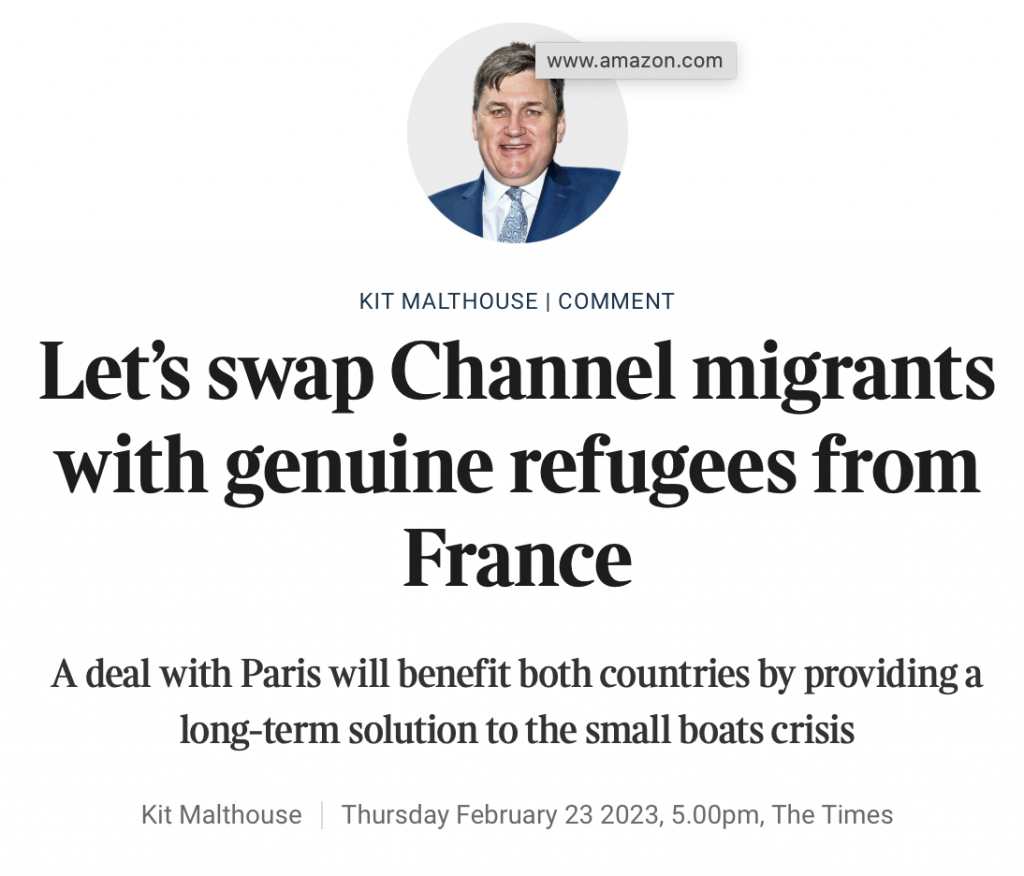A deal with Paris will benefit both countries by providing a long-term solution to the small boats crisis
Kit Malthouse Thursday February 23 2023, 5.00pm, The Times
The prime minister has made “stopping the boats” one of his five major missions, but in the battle in the Channel between the government and the gangs, the criminals are still winning. I am sure that ministers in London and Paris wake every morning and grab their phones, dreading news of bodies on the beach.
As it stands, if you have the money to pay a people smuggler, the odds of success are decisively in your favour. All the measures put in place thus far — partnerships with France, military primacy in the Channel, removals agreements, the danger warnings and so on — have seemingly done nothing to affect the migrant’s assessment of whether reaching England’s beaches is achievable and worth the money.
Meanwhile, the controversial Rwanda removal policy remains stuck in the legal mud. But even if the first flight eventually takes off, the Rwandan government has said it expects to process only a few hundred people a year during the five-year trial — hardly enough to deter the thousands crossing.

Immediately returning migrants to France when they are intercepted should put others off attempting the dangerous crossing.
Even if it did have an impact, who is to say that the truly evil gangs that facilitate this migration wouldn’t just lower their price in response to elevated risk, and hence maintain volume. To them, it’s a business with the same equation as any other: if demand is high, price is a function of risk and reward.
There is some good news, however, and with it the prospect of a smart, humane and effective way to shift the odds decisively.
Unnoticed by many, the advent of military primacy in the Channel has led to a much-improved operational relationship with the French authorities. Outside the political spotlight, the UK and French teams have quietly got on with their principal job of interception to the extent that, between them, they now control more than 95 per cent of attempted crossings, many of them before they leave the beach in France.
Indeed, it is a near certainty that if you set off from Albania bound for the UK, you will be intercepted. In that sense, illegal immigration is not “out of control” at all. But it’s what we do next that gets complicated.
In fact, this level of interception presents the opportunity to create a certainty of failure and bring an end to this life or death gamble. The solution does, however, require a leap of faith.
To begin, we would agree with our French partners that every migrant intercepted — now nearly 100 per cent — would be returned to France immediately by boat. Why would France agree to this? Because in exchange for each intercepted migrant, we would take a genuine refugee from within France. This would achieve three things.
First, we would entirely remove the ability to cross, and certainty of failure would be achieved. The gangs would have no service to sell at any price, which would result in plummeting numbers even trying to cross.
Second, while we would initially take some genuine refugees from France until the gangs and their customers got wind, we would be in no worse position on overall numbers, and it would allow us to take these refugees in a controlled fashion, resettling them properly.
Third, we would assist the French with their own burgeoning refugee population of half a million plus, at least to begin with. They would certainly be in no worse a position and, with a near-zero possibility of getting to England, who would travel to, and gather on, their coast? Local politicians across the Hauts-de-France and Normandy would bless the day.
The critical leap of faith is to recognise that, in making these exchanges, we would see numbers drop so significantly that quite quickly we would not have to undertake any such swaps at all. Given the certainty of failure, no one would think that attempting to cross was worth it, so the cross-Channel traffic would cease, and with it the need to make these exchanges.
Of course, there would be some practical issues to address. For instance, we would need some form of ID system such as facial recognition on the interception boats to detect repeated attempts, but only in the short term before numbers dwindled to nothing. And in the long run we would have to maintain our near-100 per cent interception capability indefinitely, but this is surely a worthwhile investment against the billions we would otherwise spend on housing, processing and flights to Rwanda.

An ID system such as facial recognition would need to be installed on boats to prevent repeat crossing attempts.
Our first objective should be to secure French agreement to a joint approach to the EU with such a plan. This would lay the foundations for a wider arrangement to include all those countries in reach. Don’t forget it’s only 52 miles from the Belgian beaches to Deal and 100 miles from the Hague to Lowestoft, distances that will be tempting to the gangs.
Last autumn, Emmanuel Macron welcomed the UN high commissioner for refugees to the Élysée Palace. The French president reaffirmed his profound commitment to welcoming refugees and agreed that France would co-chair the next Global Refugee Forum at the end of 2023. In doing so, the official report said, he “expressed his determination to ensure that the event allowed more co-operation on welcoming refugees and strengthening asylum systems around the world”.
As Rishi Sunak heads to his summit with the French president in March, seeking to reset our relationship, I sense he will find in Macron a willing partner keen to find an elegant and humane way of ensuring that neither wakes up to bodies on the beaches of France or England ever again.
Kit Malthouse is Conservative MP for North West Hampshire, former education secretary and former chancellor of the Duchy of Lancaster.

